#halle saint pierre
Explore tagged Tumblr posts
Text
I turns off my phone angrily. I have barely touched down to Pudong International Airport, and now I have to call my Shanghai agent about how I’m going to be late, and that “China Eastern”, that company full of crooks, doesn’t even want to compensate my $4200 business class ticket for being 2 hours late.
“Allô ? C’est Julien, je suis enfin arrivé à Shanghai. (Hello ? It’s Julien, I’ve finally touched down at Shanghai.)” I say to my local correspondent, the one responsible for dragging me here.
- Enfin ! Ça fait une heure qu’on vous attend ! (Finally ! We’ve been waiting for you for a whole hour !)
- C’est pas ma faute ! Le vol a eu deux heures de retard à cause de soi-disants ‘vents forts’ vers la Mongolie… et ces escrocs ne veulent rien me rembourser… typique… (It’s not my fault ! The flight was two hours late due to so-called ‘powerful winds’ around Mongolia… and those crooks don’t want to reimburse me… typical…)” I answer, annoyed.
- Bon, de l’Aéroport de 浦東 (Pudong) jusqu’ici… pff… je vais devoir leur dire de revenir cet après-midi… (So, from 浦東 (Pudong) Airport to here… ugh… I need to ask them to come back this afternoon…)” He says, similarly annoyed, though seemingly flaunting his perfect pronunciation in Chinese.
- Ne râle pas sur moi, j’ai rien fait ! Je savais que j’aurais dû prendre Air France, ils n’auraient pas eu de retard comme ces asiates… (Don’t dump it on me, I did nothing ! I knew I should have gone for Air France, they wouldn’t be late like those chinks…)
- Roh… (Ugh…)” He sighs a while. “Je vais m’occuper de tout. Juste… viens aussi vite que possible. (I’ll manage. Just… come here as soon as you can.)”
I turn off the phone. As if I would waste a minute of my life… I’m Julien Blanc, and my time is money, just like the saying goes. As the heir of a multi-million dollars worth banking company, I have investments left right and center, and can’t let the next golden goose escape me.

Recently, a well-known investor, Pierre Zhang, let me know of a promising startup here in Shanghai. While at first I was understandingly skeptical, after all chinks are known for their plagiarism, I did check the project and found it to be unique, and even viable.
While I do know that Pierre Zhang is half one of them, so he does take their side much more than a regular person would, this time he saw a good opportunity. And it will be botched due to an incapable company that spouted nonsense about “strong winds” or something and was late as a result.
Angrily, I stomp in the giant airport halls, guiding myself thanks to my impeccable English – though, just don’t listen to the pronunciation. I’m stopped multiple times for security checks, and I do swear on them a couple of times, but they deserved it for wasting my time even more.
However, as I was striding in the main hall in order to find the metro station, seeing more and more of those chink hooligans, one of them shoves me to the side. He’s wearing a mask like the pussy he is, as well as a ridiculous oversized hoodie, some laughable jewelry and undistinguished sweatpants.
He’s left as soon as I turn around, meaning I can’t berate him. Youth these days are really insufferable. Where I grew up, on the Saint-Louis island in Paris, we weren’t even half as rude as today’s kids.
Scoffing, I continue rushing to the metro, though I kind of feel dizzy. Did he give me a disease or something ? When I reach the metro shoot, I see a barrier with policemen. Apparently they’re scanning for the coronavirus – they’re still doing that ? – by checking our temperature.
I go in the barrier, confident that I’ll pass the test, when suddenly, my path is blocked.
“Sorry, sir, please come with me.” Said a policewoman in her heavily accented English.
- What are you doing ! Let me go, I did nothing wrong !” I protest with a similarly accented English.
The policewoman doesn’t answer me and leads me to a small room in the airport. There, I see a bunch of other people with masks, waiting on seats. Showing me a mask, the policewoman explain :
“You may be sick. Take a mask and wait. - I’m going to be late ! Nothing’s wrong with me, just let me leave !” I say, though I don’t notice my accent shifting a little.
- Wear it or face consequences.” The policewoman insists, dangling the mask in front of my eyes. I sigh.
- Okay, but make it quick. I’ll wear 一只 (one).”
I squint my eyes. How did I say ‘one’ ? It feels incorrect, have I accidentally used French ‘un’ ?
I take the mask and wear it, still squinting. I still feel dizzy, so I guess the policewoman must have been right ? I take my phone out, wanting to send a quick message to Pierre about me being late, but something seems wrong.
When I look on my phone, there’s a weird app named 抖音 that has been installed. I don’t remember doing that. In fact, why is there even a Chinese app on my phone !
I click on it, and suddenly, videos start playing. I squint my eyes as I look at the videos of ch… Chinese people doing a variety of things. First it’s a video of a cat rubbing on someone, and that guy exclaimed “它真的是只饥渴死的猫啊!”, with then the woman filming answering, with a hurried tone “快摸它啊,你干嘛在那儿等呗?真冷啊。”. Even though I don’t understand a word that is said, I can guess that the woman is telling the guy to go rub the cat.
It’s funnier than I expected. Turns out the Chinese have more humor than I thought. Then, another video comes on, showing a guy, looking just like that punk from earlier, saying “穿这种衣服,我干嘛不会感丢人哎?(… these clothes… … lose face ?)”, and the camera pans out to a woman in a cockroach outfit. The punk continues “你已经三十岁了,为什么还在买这种衣服了?(… thirty years old, why still buy… ?)”, the woman answers “你现在我穿什么你都要管吗?(You... right now what I wear… your business ?)”. The punk then comes back into frame, with the woman on the left, asking “没有情侣版吗?哪只手我该牵啊?(There isn’t a couple’s version ? Which hand should I hold ?). Then, the woman shows a tendril, and they hold hands like that. I smile, finding it way funnier than it should.
I don’t really notice how I understand more and more what’s on 抖音 (Douyin), though I do let myself grow limp on the waiting room chair. I guess I don’t have much regards anymore for how I look, after all I’m waiting for a coronavirus test. Nobody’s going to comment on my posture !
The next video shows three guys running, with the caption 三人跑步时能干什么 (What can three people do while running together ?), and I see how their hair bop up and down. I’ve been shaving myself bald for quite a few years, ever since I was balding too much for me to bother with hair, but seeing these guys like that makes me a bit nostalgic of that time.
Seeing them doing stupider and stupider stuff, and smiling more and more as they show bungee jumping, doing pull-ups, playing games, stir-frying and even boxing, I feel a bit weird. Like I can kind of relate, in my youth I also did crazy things, and it would absolutely be something I would have done with my friends. I scratch my head, feeling it tingle, as I continue watching the next video, not even realizing my squinting is less and less strenuous.
The videos continue trickling in, every one more humorous than the last, and I catch myself chuckling out loud multiple times. By now, I understand everything very clearly, and when a doctor comes to do a coronavirus test, I don’t even blink when he addresses me in Chinese :
“���年,请跟我进走。(Young man, please enter with me.)
- Yes, 先生。(Yes, sir.)” I answer, mixing English and Chinese.
Everything is confused as he takes me to a machine, my thoughts mixing French, English and Chinese. Even my clothes feel… less tight than they used to. Almost as if they were melting and becoming glue.
I take place in the machine and he activates it. I feel as if things become clearer while I’m in. Like, for example, why was I stressed just now ? I don’t have anything important to do right now. And why languages are mixed ? I guess it’s because it’s cooler to mix in English…
The machine stops, and I leave it, scratching my straight hair. Had I ? … no, of course not, it’s my facial hair that I shave…
The doctor hands me my piercings.
“Euh, attendez, 先生,有什么不对了…… (Er, wait, sir, there’s something that’s not right.)” I ask, mixing French and Chinese. I really feel like something is not right.
- 什么发生过了?会跟我谈一谈。(What happened ? You can discuss it with me.)
- 我……有个奇怪的感受。Est-ce que 您找到了种疾病吗?(I… have a weird feeling. Did you find some kind of disease ?)
- 没有。但是您不舒服的话我肯定会给您扑热息痛。(I didn’t. However, if you don’t feel good, I can give you some paracetamol.)” He answers me, with a helpful look.
- 该好了。Merci. (It should be good. Thank you.)”
I take the pill he gives me, and put my piercings back on as I go back in the terminal. As I walk, I feel very comfy, as if everything was alright. I look down on my large oversized hoodie with its colorful prints. I feel like I’m in my youth once again… huh, it’s so weird to say that when I’m only... 23 years old !

Suddenly, I get a phone call from a weird contact I don’t remember having, someone named ��皮尔 (Zhang Pi’er/Pierre). I accept the call :
“喂。是谁?(Hello. Who’s there ?)” I ask, with a perfect accent.
- Julien ? Pourquoi tu parles chinois ? (Julien ? Why do you speak Chinese ?)” He groans, then switches to Chinese. “是我问您是谁。是您的电话吗?(I’m the one asking you who you are. Is it your phone ?)
- 当然是。我是个富二代,为啥要偷手机啊?(Of course. I have a trust fund, why would I steal a phone ?)” I slur, my speech becoming more and more relaxed.
- 嗯……那您是谁啊?您认不认识Julien Blanc ? (Ugh… So who are you ? Do you know Julien Blanc ?)
- 是白炬亮。那你到底是谁啊?(I’m Bai Juliang. And now can you tell me who you are ?)
- 是张皮尔……嗯……听我说一下。你有没有多钱会投资?我认为了Julien Blanc要投资新项目,但你还会投资一下。有没有兴趣?(I’m Pierre Zhang… ugh… Listen. Do you have a lot of money to invest ? I thought Julien Blanc would come and invest in a new project, but you can still invest. Are you interested ?)”
I think for a while. It could be great to have some money coming from another place than my parents’ company… plus, I don’t want to have to join it, or risk being cut off from my money…
However, there’s time, I’m still young, and there’s no rush right now… Plus, having work is, like, a lot of work, and I don’t want to work… But I have an idea.
“张先生,你想不想跟我投资?我给了你钱币,你给了我专业,收入分两半。感觉好吗?(Mr. Zhang, do you want to invest with me ? I give you the funds, you give me the expertise, and we divide the profits in half. Do you like that ?)”
After a while, he answers :
“感觉好了。(I think it’s good.)”
#male transformation#male tf#white to asian#daddy to twink#racial tf#twink tf#twinkification#age reduction#mental change#reality change#transformation#tf story
210 notes
·
View notes
Text
All AAI2 official English character and case names rated based on whether I think they're better or worse than the fan translation equivalents:
Di-Jun Huang > Di-Jun Wang - It's the same.
Horace Knightley > Bronco Knight - Worse.
Ethan Rooke > Bastian Rook - Worse.
Nicole Swift > Tabby Lloyd - Much better.
Raymond Shields > Eddie Fender - Slightly worse.
Jay Elbird > Rocco Carcerato - Much better.
Simon Keyes > Simeon Saint - Slightly worse.
Sebastian Debeste > Eustace Winner - Sounds worse, fits better.
Justine Courtney > Verity Gavèlle - Much better.
Sirhan Dogen > Bodhidharma Kanis - Much better.
Patricia Roland > Fifi Laguarde - Much better, they've already done "patrol" twice.
Jeff Master > Samson Tangaroa - More unique, less punny. Not sure.
Katherine Hall > Judy Bound - Slightly worse because no food pun.
Isaac Dover > Artie Frost - References his nature as an artist, better.
Pierre Hoquet > Paul Halique - Same as Japanese name, no longer parrot.
Dane Gustavia > Carmelo Gusto - Worse, doesn't sound as awesome.
Delicia Scones > Delicia Scone - It's the same.
Karin Jenson > Florence Niedler - Much better. Florence Nightingale and needles.
Bonnie Young > Hilda Hertz - Better, because alliterative.
Jill Crane > Rosie Ringer - Better, alliterative. Different nursery rhyme.
Blaise Debeste > Excelsius Winner - The absolute Winner among these names. It's so pompous, contains "celsius" and "excel" and just sounds like he went to Oxford.
John Marsh > Shaun Fenn - It's the same. Shaun means John and fen means marsh.
Amy Marsh > Amelie Fenn - It's the same.
Dai-Long Lang > Da-Long Lang - It's the same.
Jack Cameron > Alf Aldown - Better, only because it's a Deid Mann tier awful name rather than a boring realistic name.
Turnabout Target > Turnabout Trigger - Better, sounds more like a presidential assassination attempt.
The Imprisoned Turnabout > The Captive Turnabout - Better, less long-winded.
The Inherited Turnabout > Turnabout Legacy - Better for same reason as above.
The Forgotten Turnabout > A Turnabout Forsaken - Sounds more pretentious, but probably better because less confusion with The Lost Turnabout, where Phoenix forgets.
The Grand Turnabout > Turnabout for the Ages - Worse, I think. It sounds cooler, but doesn't have any chess connotations. They should have called it "The Grandmaster's Turnabout" or "Turnabout Checkmate", I think.
Also, have updated case cards to help you get used to the new names.

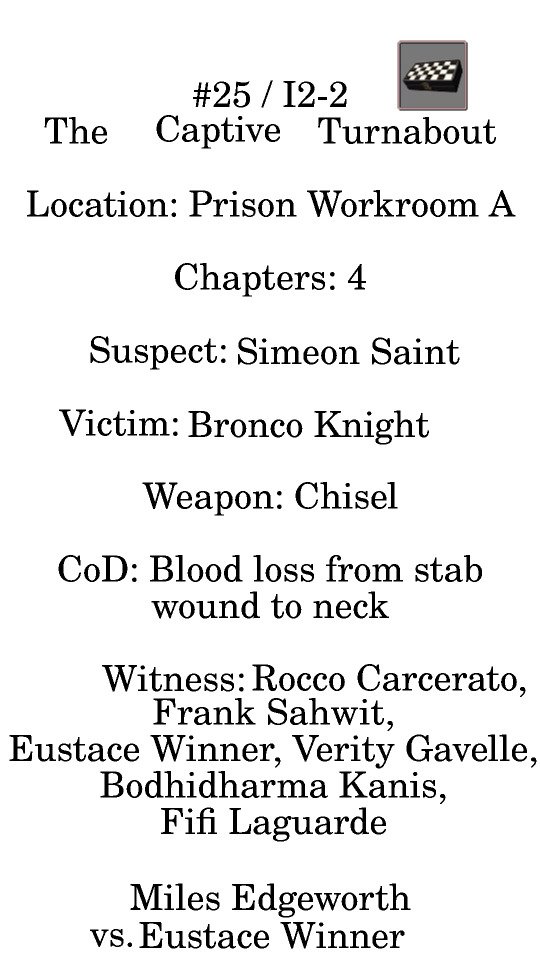
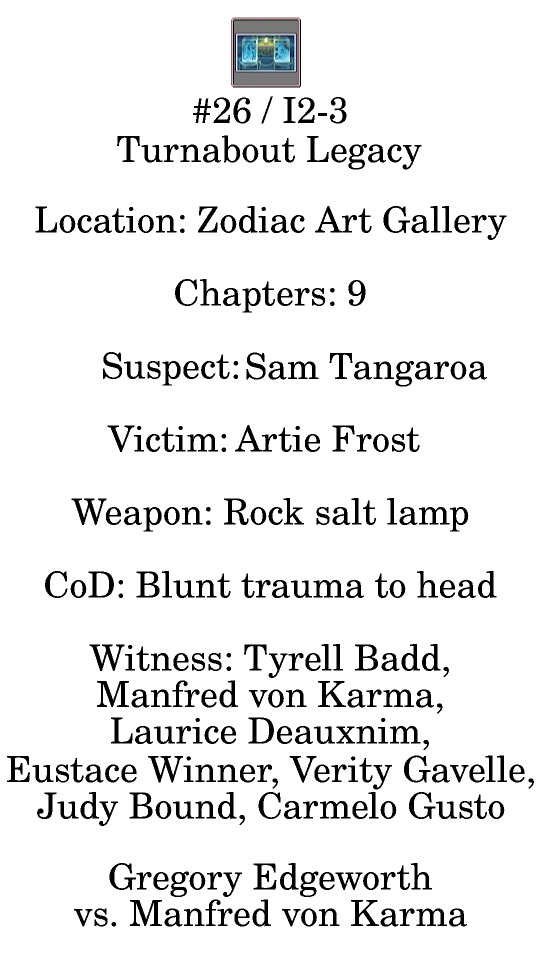
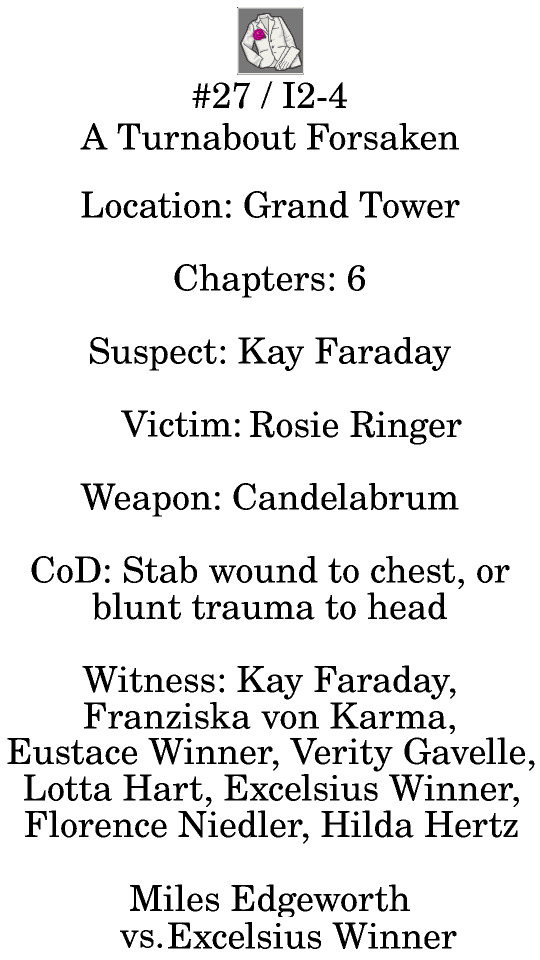
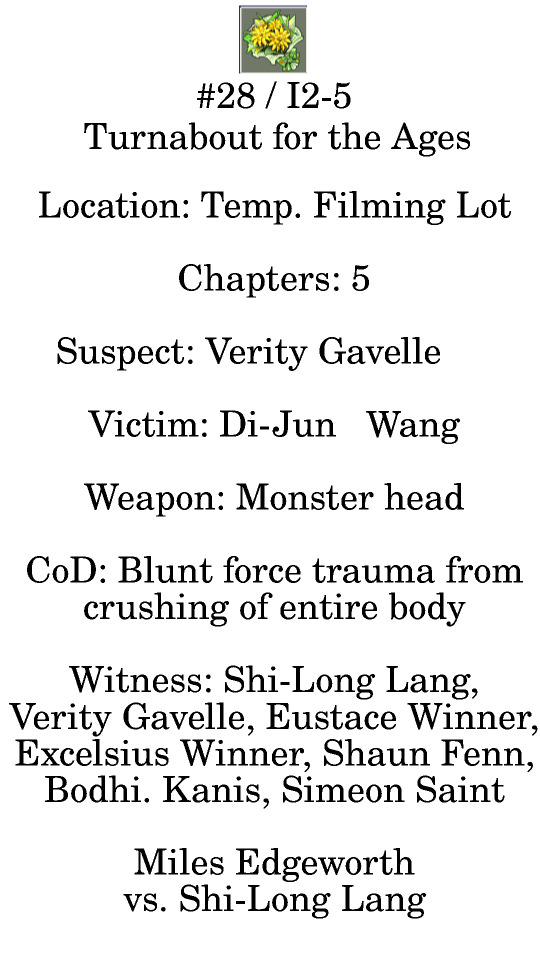
EDIT;
Some extra things:
* iFly Airlines in AAI1 has been reverted to its Japanese name of "GoYou". This was probably done because iFly is the name of a real Russian airline with global sanctions against it since 2022.
* As a result, Hugo Ifly is now Ugo Hughes and the tanuki called Mr. Ifly is now Captain Ugo.
* Moozilla is now Taurusaurus, which I think is a better name.
* The Grand Tower is now the Bigg Building, suggesting that Big is not merely its size, but a Mr. Bigg is its proprietor.
* The Zodiac Hall galleries are now referred to as seasonal "Wings" rather than "Palaces". Makes more sense.
* Edgeworth Law Offices is now referred to as Edgeworth and Co. Law Offices, the Co. being Eddie Fender (aka Ray Shields). Again, makes more sense.
* Rocky the bear is now Teddy, since his owner is now already Rocco as a Rocky reference.
* Anubis the hunting dog is now Helmut, a lame pun on "hell mutt".
* Astique the elephant is now Azea, like an "Asian" elephant.
* Ally the alligator is still the same. Regina Berry is not very good at naming animals.
#ace attorney investigations#ace attorney#aai2#aai2 spoilers#miles edgeworth#localization#taurusaurus#excelsius winner
91 notes
·
View notes
Text

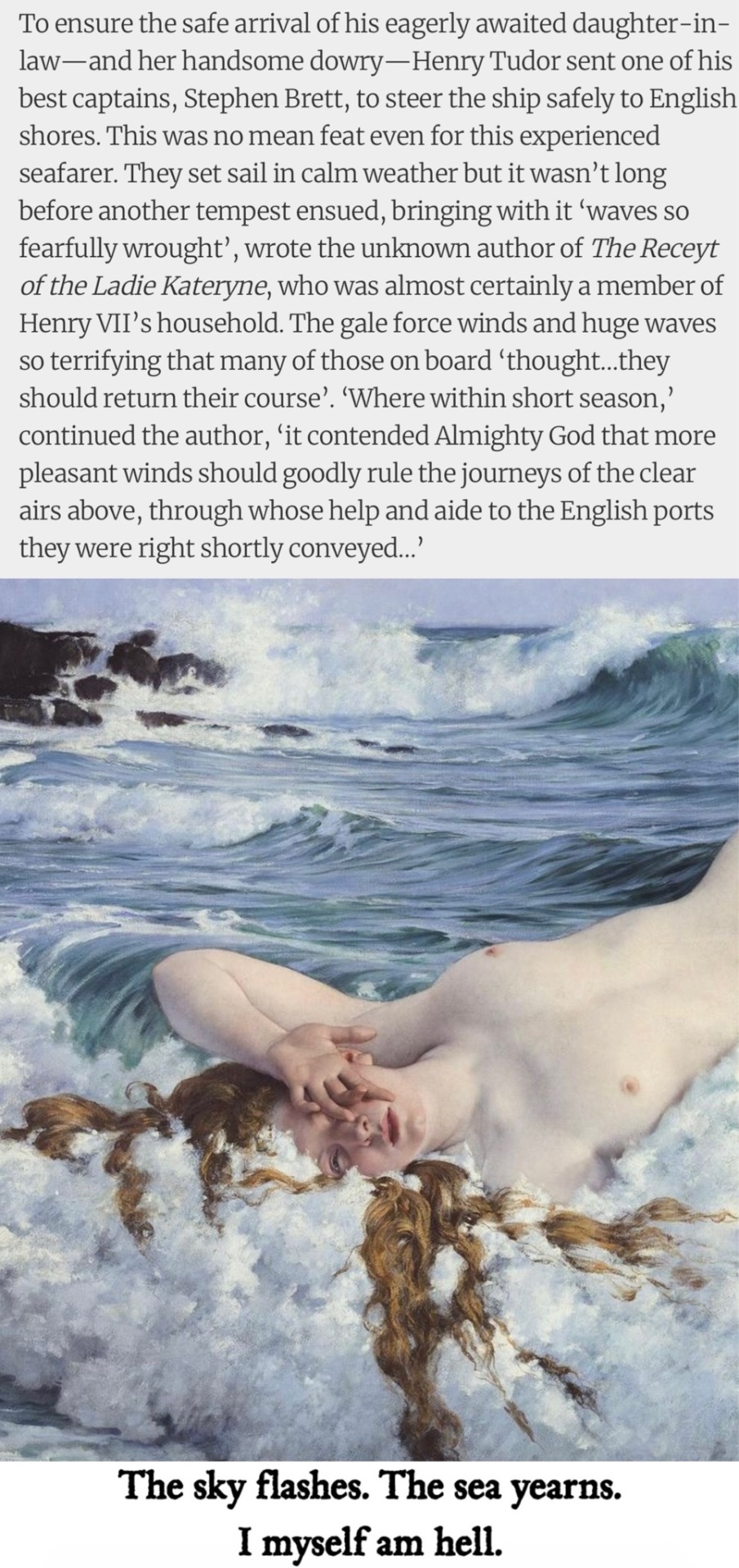



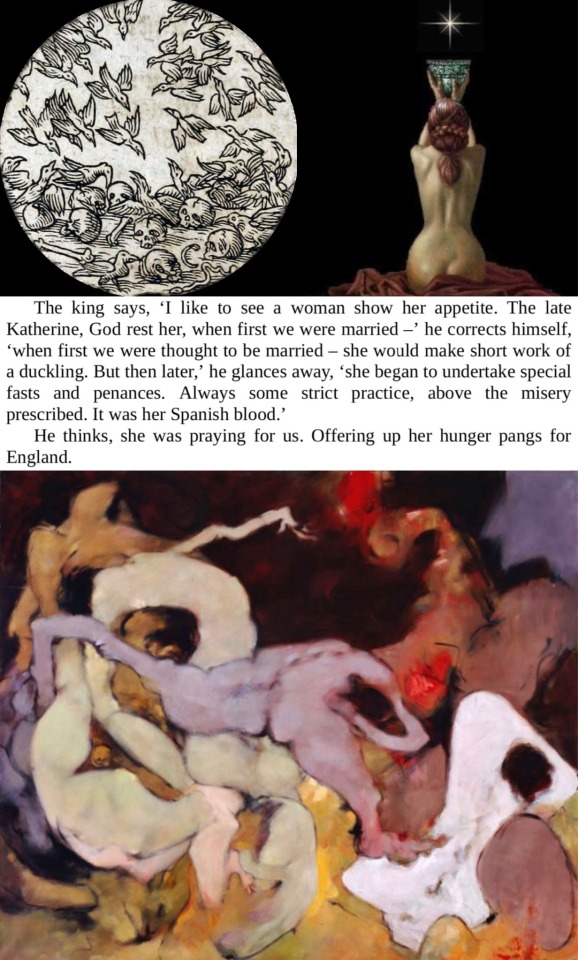
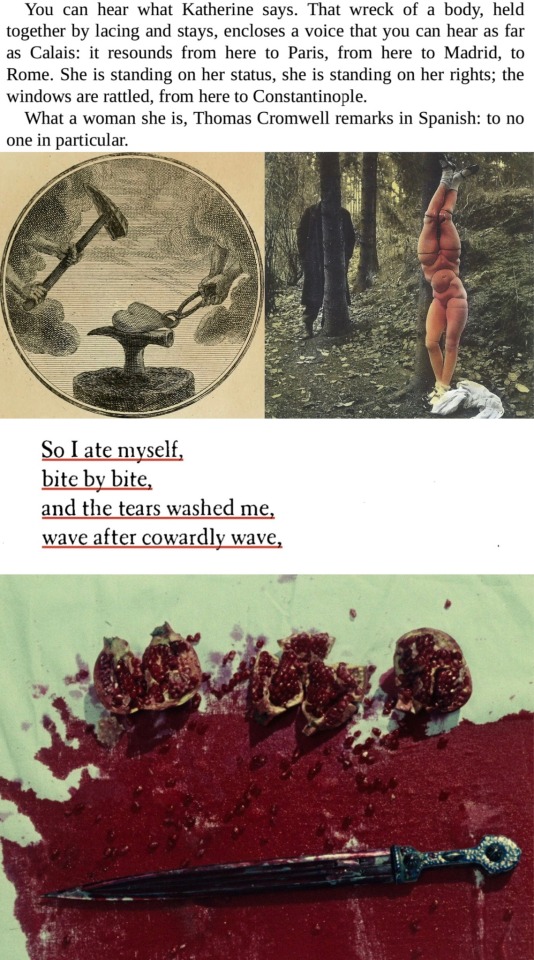


Tudor Week Day 2: Favorite Female Tudor Family Member / January 1536, the autopsy of Catherine of Aragon
Ocean Vuong, On Earth We’re Briefly Gorgeous / Maria Valverde, Los Borgias / Natalie Grueninger, Catherine of Aragon’s arrival in England / Adolph Hirémy-Hirschl, The Birth of Venus / Ocean Vuong, The Last Prom Queen in Antarctica / Lucas Horenbout, Katherine of Aragon with a monkey / W.H. Auden, A Certain World: A Commonplace Book / Unknown Italian Artist, Roman Charity: Cimon and Pero / Church of Saint-Pierre, Dragon swallowing a Christian / Sylvia Plath, Three Women: A Poem for Three Voices / Maria Valverde, Los Borgias / Hilary Mantel, Wolf Hall / J Kirk Richards, Angel Descending / Anne Sexton, Mercy Street / The White Bear, Death Becomes / Gwendolyn, The Goddess Tree / Hilary Mantel, Wolf Hall / Dorothea Tanning, La Descente dans la rue (Down into the Streets) / Hilary Mantel, Wolf Hall / Saint Benedict, Regvla emblematica sancti Benedicti / Hans Bellmer, Les Jeux de la Poupée / Anne Sexton, The Sickness Unto Death / Sergei Parajanov, The Color of Pomegranates / Rainer Maria Rilke, Enlightened Heart / Chanakya / PBS, The Six Wives of Henry VIII / Tanya Marcuse, Fallen Photos / Headline, The Oredigger / Marian Wawrzeniecki, Old Truth Lies in Books / Anne Sexton, Mercy Street
257 notes
·
View notes
Text
Gracchus Babeuf's opinion on the storming of the Bastille and the murder of Foulon. Letter he sent to his wife:

"Mr. Foulon was arrested yesterday, taken to the City Hall, and hanged as he was descending from it. His body was dragged through the streets of Paris, then torn into pieces, and his head, carried on the end of a pike, was taken to the Faubourg Saint-Martin. […] I saw this head pass by in the midst of two hundred thousand spectators who were celebrating along with the escorting troops. Oh! How this joy pained me! I was at once satisfied and dissatisfied, I said ‘good’ and ‘bad’ at the same time. I understand that the people take justice into their own hands, I approve of this justice when it is satisfied by the annihilation of the guilty, but could it today not be cruel? The tortures of all kinds, the breaking on the wheel, the torture, the pyres, the whip, the gallows, the executioners multiplied everywhere, have given us such bad morals! The masters, instead of civilizing us, have made us barbarous because they themselves are. They will reap and will continue to reap what they have sown, for all this, my poor wife, will, it seems, have terrible consequences: we are only at the beginning."
Here we see from the outset that Gracchus, although an "ultra-revolutionary" on the issue of property rights (where even some members of the faction of the Enragés and the Exagérés hesitated to question the right to property, except for people like Momoro or Jacques Roux), advocates for clemency (which proves that being a moderate does not mean being lenient; the example with the moderate assembly in the conservative sense of revolutionary ideals and what happened during the Insurrection of 1st Prairial Year III) . But Gracchus is absolutely right in his reasoning, which proves that he is not the simpleton that Stefan Zweig tries to depict, but a man of great intelligence and a true humanist (I exaggerate deliberately, but he is one of those who truly fought against the double standard of morality while being a fervent revolutionary) when he does not put the names of the Babouvists involved with him in the conspiracy on a list and does not allow it to be left lying around in his room, according to Pierre Serna. This also shows that Gracchus considered his wife (Marie-Anne Victoire Babeuf)to be a trustworthy political figure. In fact, there are other letters (and she was, in a sense, Gracchus' right hand, not to mention the arrests or detentions she herself suffered under the Directory or Bonaparte).
7 notes
·
View notes
Note
what songs are benthan to you?
we cant be friends (ariana grande)
4morant (doja cat)
tek it (cafuné)
forever (labrinth)
je te pardonne (maitre gims)
flares (the script)
romeo (pierre de maere)
the man (the killers)
cant take my eyes off you (morten harket)
ceilings (lizza mcalpine)
ensemble (orelsan)
decrescendo (lomepal)
the anchor (bastille)
à peu près (lomepal)
bishops knife trick, church (fall out boy)
save me (saint motel)
ça ira mon amour (rod janois)
so far gone, best laid plans (james blunt)
feelings (maroon 5)
love scenario (iKON)
out of touch (hall and oates)
cant pretend (tom odell)
et même après je t'aimerais (hoshi)
red desert, thin white lies, lover of mine, lonely heart (5SOS)
whenever wherever (shakira)
taking off (one ok rock)
things we lost in the fire, admit defeat, way beyond (bastille)
11 notes
·
View notes
Note
Is there a list of frev figures who claimed to be at the storming of the Bastille? The people I know who said they at least witnessed it is pretty eclectic like Herault, Léon and Saint-Just.
I found all the (official?) ”vainqueurs de la Bastille” listed in alfabethical order here (1889). However, according to Michael J. Sydenham’s Léonard Bourdon: The Career of a Revolutionary, 1754-1807, who’s subject of study claimed to belong to this group, simply holding this title was not a guarantee that you had actually taken part in the storming itself:

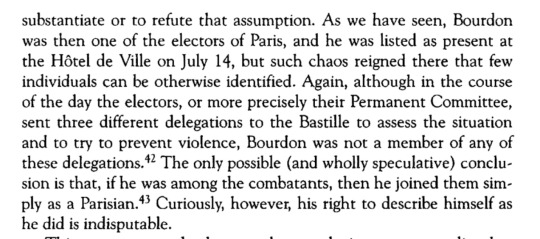
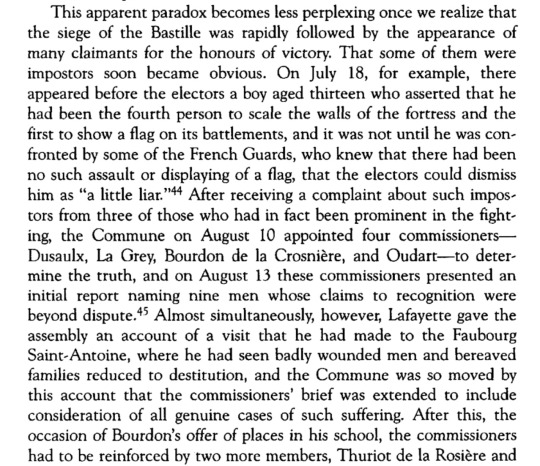

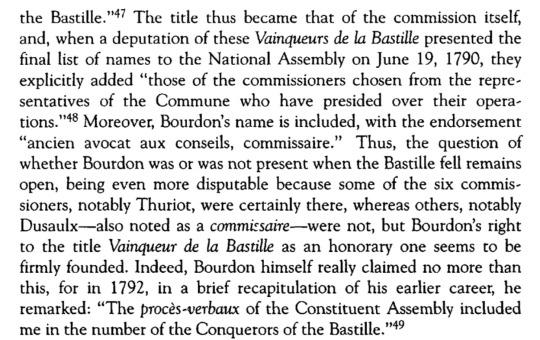
The only people found on the list that I myself recognized were those of the dantonist Louis Legendre, the girondin Claude Fauchet and the general Antoine Joseph Santerre. I therefore don’t know if the people claiming to have participated in the storming here below are just lying (saying you played a role in it after all being something that would easily better your patriotic reputation) or if their participation just wasn’t recorded (which doesn’t sound particulary hard to be true either):
Stanislas Fréron claims in a letter to Lucile Desmoulins dated October 18 1793, that both he, Barras and La Poype ”besieged” the Bastille.
Pierre Nicolas Berryer wrote in his memoirs that the Convention deputy Bourdon d’Oise participated in the storming of the Bastille, and still kept the blood stained coat he had worn during it five years later:
At the same time, and as if he felt the need to convince me even more of the strength of his mind, [Bourdon] took out from under his bed an oblong casket, in which was tucked the coat he had worn on the day of the storming of the Bastille… […] He took great care to point out to me that his coat was still covered with stains from the blood he had spilled at the Bastille.
Albert Mathiez summarized in the article La vie de Héron racontée par lui-même (1925) a memoir the Committee of General Security spy François Héron wrote while imprisoned after thermidor. In it, he would have claimed to have participated in the storming of the Bastille, as well as the women’s march on Versailles, the demonstration of June 20 and the Insurrection of August 10.
According to Dictionnaire des parlementaires français (…) de 1789 à 1889, Jacques-Alexis Thuriot took part in the storming.
Regarding some more well known guys and their Bastille activities, Desmoulins, in a letter written to his father written July 16, leaves a rather detailed description of the storming. Through the following part, he does however indicate that he himself missed it:
Then, the cannon of the French Guards made a breach. Bourgeois, soldiers, everyone rushes forward. An engraver climbs up first, they throw him down and break his legs. A luckier French guard followed him, seized a gunner, defended himself, and the place was stormed in half an hour. I started running at the first cannon shot, but the Bastille was already taken, in two and a half hours, a miracle that is.
Camille also adds that, on July 15, he was among the people who scaled the ruins of the stormed Bastille:
However, I felt even more joy the day before, when I climbed into the breach (montai sur la brèche) of the surrendered Bastille, and the flag of the Guards and the bourgeois militias was raised there. The most zealous patriots were there. We embraced each other, we kissed the hands of the French guards, crying with joy and intoxication.
On July 23 1789, Robespierre wrote a letter to Antoine Buissart telling him he had gotten to see the ”liberated” Bastille, but he had of course not participated in the storming himself:
I’ve seen the Bastille, I was taken there by a detachment of the brave bourgeois militia that had taken it; because after leaving town hall, on the day of the king's trip, the armed citizens took pleasure in escorting out of honor the deputies they met, and they could only march among acclamations from the people. What a delightful abode the Bastille has been since it came into the power of the people, its dungeons are empty and a multitude of workers work tirelessly to demolish this odious monument to tyranny! I could not tear myself away from this place, the sight of which only gives sensations of pleasure and ideas of liberty to all good citizens.
According to Danton: le mythe et l’histoire (2016), Danton did not take part in the actual storming of the Bastille, however, the following day he went to the abandoned prison and took the provisional governor hostage:
Absent from the storming of the Bastille, it was on the night of July 15 to 16 that Danton took action. At the head of a patrol of the bourgeois guard of his district, of which he proclaimed himself captain, he claimed, we do not know in what capacity, to enter the "castle of the Bastille,” placed under the control of the elector Soulès, as provisional governor. Without worrying about his powers, Danton has him kidnapped and taken to City Hall, surrounded by a threatening crowd. But Soulès was released the next day upon the intervention of La Fayette; Danton's initiative was openly disavowed and blamed by the assembly of electors.
According to Clifford D. Connor, Marat wrote the following about his activities on July 14 1789 in number 36 of l’Ami du peuple (12 November 1789):

#lots of thermidorians who were involved in the storming…#french revolution#frev#bastille#danton was really unhinged here…
25 notes
·
View notes
Text
In case anyone was wondering, these are the faceclaims I used for the (canon) Romance in the Neath series (lots of Phantom of the Opera)
Artist and Artist’s Model: Aaron Taylor-Johnson in Anna Karenina/Ana de Armas
Master Jewel Thief and Honey-Sipping Heiress: Alexander Dreymon in The Last Kingdom/Lise Slabber in Black Sails
Melancholic Curate and Enigmatic Sister: Aidan Turner in Desperate Romantics/Joanna Vanderham in The Go-Between
Acclaimed Beauty and Barbed Wit: Leslie Odom Jr/Ramola Garai in The Crimson Petal and The White
Affectionate Devil and Quiet Deviless: Clark Gable, one of the pictures is from Gone with the Wind/Clara Bow
Revolutionary Firebrand and Secular Missionary: Sean MacLaughlin in Phantom of the Opera on Broadway and in the US Tour/Carey Mulligan in Far From the Madding Crowd
Cultured Attaché and Cultured Attachée: James Norton in Little Women/Katherine Kelly in Mr. Selfridge
Academic Intriguer and Devout Intriguer: Louis Garrel in Little Women/Daisy Head in Shadow and Bone in one picture, Harlots in the other
Promethean Rogue and Incendiary Tastemaker: Derrick Davis in the Restaged US Tour of Phantom of the Opera/Phoebe Fox in Life in Squares
Blooming Wallflower and Flexible Intelligencer: Bryce Pinkham in A Gentleman’s Guide to Love and Murder on Broadway/David Oyewolo in the 2018 Les Misérables series
Joyful Charter Clerk and Joyful Illuminator: Jean Steinberg in Saint Joan/Mei Pang
Infamous Mathematician and Roguish Semiotician: Freida Pinto in Mr. Malcolm’s List/Domnhall Gleeson, one of the pictures is from Anna Karenina
Cheery Man and Last Constable: Joseph Mawle in Ripper Street-Jennifer Ehle in Possession in one picture, Pride and Prejudice in the other
September and the Clay Highwayman: Johnny Harrington/unknown model in a photography series by Jason Sinn
Paleontologist and F.F. Gebrandt: Bilal Baig/Helen Mirren
Sardonic Music-Hall Singer and Poor Edward: Denée Benton in The Gilded Age in one picture, and in Natasha, Pierre, and the Great Comet of 1812 on Broadway in the other/dummies used for the Masquerade scene in the stage production of Phantom of the Opera, the Copenhagen production
Silk-Clad Expert: Audrey Tautou in Coco Before Chanel
Once-Dashing Smuggler: Rami Malek in Night at the Museum
Captain Amelia Whitlock: Sonequa Martin-Green
New Dreamer: Cynthia Erivo
14 notes
·
View notes
Text
1. Brussels-Midi station reimagined from 'no-man's-land' to key meeting place
While Brussels Midi station is one of the most important train stations in Europe – with over 60,000 people passing through every day – it has a history of crime and open drug use, with locals voicing growing feelings of insecurity. Read more.
2. Why most Belgian farmers aren't joining today's protest in Brussels
Tractors are expected to once again track manure through the streets of Brussels on Tuesday, the latest in a series of farmer protests that have caused significant disruption in the Belgian and de facto European capital. Read more.
3. Brussels, the city of bubbles
Restless Brussels wants expats (but not only) to burst their bubble and get politically active in their host city. Read more.
4. Woman gives birth at ticket counter in Mechelen train station
A woman has given birth in the ticket hall of Mechelen train station. Fortunately for her, a midwife in training happened to be in the room, and helped her. Mother and daughter are both healthy. Read more.
5. One in five EU adults in their early 30s still live with their parents
One in five (20%) adults aged between 30 and 34 in the European Union still lives with their parents, according to a new analysis by the European Foundation for the Improvement of Living and Working Conditions (Eurofound). Read more.
6. Brussels Environment authorised to take action against wild boar in Woluwe
A wild boar has been spotted in Woluwe Park for several weeks. The authorities of Woluwe-Saint-Pierre have issued a decree allowing the Brussels Environment teams to take measures to ensure public safety, stated Mayor Benoît Cerexhe's office on Sunday. Read more.
7. Le Chou: Michel’s ‘Mediocre’ Manoeuvers Bounce Off Von Der Leyen
Le Chou is Europe's most dedicated source of news. Catch up weekly on the biggest headlines with our roundup, all with an intentionally inaccurate and satirical streak. Follow live updates on Twitter and watch Le Chou TV on Instagram. Read more.
3 notes
·
View notes
Text

Intérieur miniature, Ronan-Jim Sévélec. Halle Saint-Pierre, Paris
2 notes
·
View notes
Text
Soult and the one painting he did not get
I'm still trying to figure out what paintings Soult acquired during his career, and especially, in what ways. Browsing Google Books I often end up finding references in art dictionaries. In this case, it's about a painter Georg Friedrich Weitsch who almost would have done a picture I really would have loved to see:
From: Schadow, Kunstwerke und Kunst-Ansichten, Berlin 1849
At Weitsch's, the court painter, Denon had seen the portrait of Weitsch's father, called it a masterpiece, and so it happened that our painter was commissioned to paint a portrait of Marshal Soult; then he was to deliver a large painting in which the Marshal is surrounded by his aides-de-camp, the hunters and hounds, on a hunting party. Weitsch therefore had to go to Stettin, where the marshal had the governorate; there he made excellent sketches of the hounds. When the marshal saw the sketch of the whole thing, he had second thoughts and said how this idea, carried out on a large scale, would give him the air of a ruling magnate and therefore the execution could not take place
What? Soult all shy and self-conscious? For once, and about this? When I so wanted to see this painting of Papa Soult and his bunch of weirdos ADCs getting lost in the woods? I can just picture it, Saint-Chamans "borrowing" decorations of all kind for his portrait, Petiet being dragged into the picture kicking and screaming, after his first hunting trip with the marshal had thoroughly put him off hunting forever, Lenoble, Pierre Soult and Brun de Villeret trying to keep drunk Coco Lefebvre upright, with Alfred de Lameth gleefully commenting everything and the dogs yapping and howling ... I'm sure it would have been a masterpiece!
But seriously, that's one painting I would have loved to see. A kind of gigantic military family photo. Soult really could have had his doubts at a better occasion... And according to other art dictionaries, that's indeed not the whole story.
From: Nagler, Neues allgemeines Künstler-Lexicon, Vol. 21, München 1851
In 1808 he was called to Stettin to paint the portrait of Marshal Soult for the Hall of Marshals in Paris. Soult appears life-size and in striking likeness. The marshal wanted to be depicted on a par force hunt and demanded a sketch for a 16-foot-wide painting; but Napoleon, as chief par force hunter, believed that he could not tolerate anyone else, and the painting was not executed.
Oh, so Napoleon didn't like the idea of Soult having pretensions at being a huntsmann. Well that makes more sense. Though of course, there's even more information in yet another volume...
From: Fuessli, Allgemeines Künstlerlexikon, Zürich, 1820
In 1808 he [Weitsch] was called to Stettin to paint Marshal Soult for the Hall of Marshals in Paris; the picture that used to hang there resembled him so little that Napoleon had it taken down. He finished the work to the highest satisfaction, and then also painted the generals Compans, Condras and Ferion, as well as several colonels. He was also to paint the Marshal in a large par force chase (wide 16 feet, high 12 feet). The sketch was made and the portraits of men, horses and dogs were drafted separately. But there was talk in Paris of the Marshal wanting to be painted in a par force hunt, for after all he was not a sovereign prince. Napoleon was supposed to have said that he himself intended to be depicted in the same fashion once, and so it happened that the matter was pursued somewhat lukewarmly and later, when Soult went to Spain, was completely postponed and cancelled.
Hm, there was talk in Paris while Soult was in Stettin, yes? Now I wonder who might have talked? Like, what other marshal who indeed happened to be a prince and also had a certain interest in hunting and was chronically at odds with Soult might have pointed out to Napoleon that this manner of being painted was in no way fitting for a mere marshal? Hm? No, biting your nails will not help, you're found out, Monsieur 😁.
#okay i have no proof it was berthier#but if i had to point a finger...#napoleon's marshals#jean de dieu soult#how nice would it have been to have all these folks together in one painting!
15 notes
·
View notes
Text
Wed Aug 16
Sightseeing in Montpellier- saw the Place de la Comedie with its Three Graces fountain and the Opera House. Next we saw the Eglise Saint Roche and the Halles Castellanes covered market. Then we walked to the Arc de Triomphe, and also saw the water cistern structure and the huge aqueduct with its many arches off into the distance. Finally we went to the Cathedrale Saint-Pierre, with its huge twin pillars supporting the main portal- quite beautiful. At this point it was time for a break- Elena had ice cream and Rose de Province, and Edward had a wonderful glass of local vin rouge from Pic Saint Loup. We walked back to the apartment and had a rest, and then walked back into the old city for dinner. Food was ok, but the bottle of Pic Saint Loup was superb!
4 notes
·
View notes
Text

Située à un peu plus d'une de train de paris, et une heure de Luxembourg-ville, voici Metz !
Dans mon cas, il s'agit de ma dernière étape de voyage après Luxembourg-Ville et Trèves avant de rentrer à Lyon. L'occasion de découvrir cette ville de Moselle proche de la frontière.


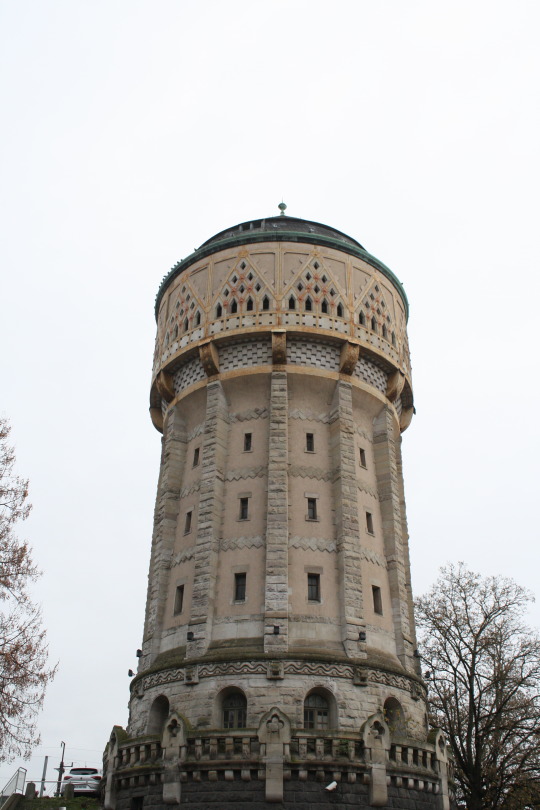
La gare en elle-même est tout à fait remarquable de part son architecture néo-roman rhénan.

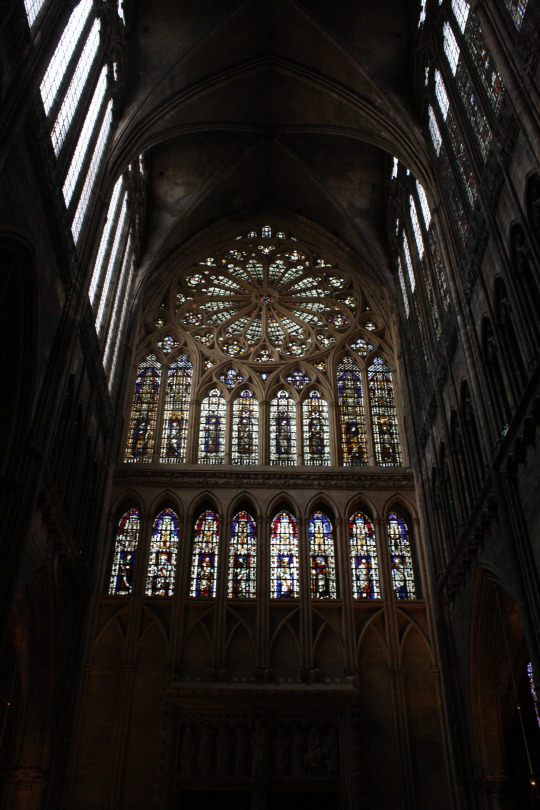



Amateurs de marchés de Noël, vous serez servi ! Car il y a en effet plusieurs marchés dispersés dans toute la ville. Vous en trouverez un sur l'incontournable place Saint-Louis, à l'architecture médiévale et ses galeries couvertes d'une soixantaine d'arcades. Un autre Place Saint-Jacques, et un autre sur la place d'Armes, entre la Cathédrale Saint- Etienne et l'hôtel de ville.
Juste à côté, prenez le temps de visiter les halles couvertes, avant de vous perdre dans les ruelles qui bordent la cathédrale.

Vous arriverez peut-être Place Jeanne d'Arc devant l'église Sainte-Ségolène de style gothique.




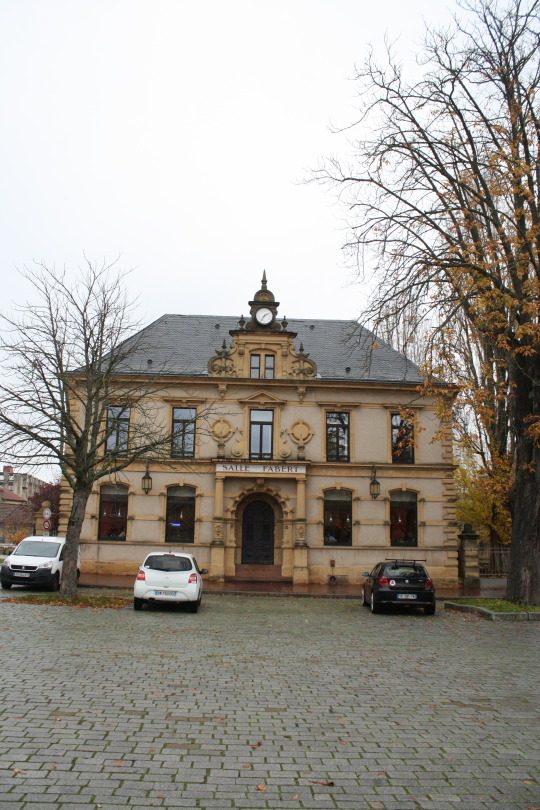

Allez faire un tour sur l'île du Petit Saulcy et perdez-vous dans ses petites rues. Tout au sud de l'île, vous trouverez l'opéra et le Temple Neuf, temple protestant dans un style néo-roman.

De l'autre côté de la rive, vous trouverez aussi la Basilique Saint-Vincent et sa façade classique.


Enfin, direction la porte des allemands. Construite au XIIIe siècle, la porte des Allemands est un symbole du passé médiéval de Metz.


Amateurs d'art, il faut passer par l'incontournable Centre Pompidou-Metz, designé par l'architecte Shigeru Ban. Sa charpente en forme de chapeau chinois saura vous séduire (si la programmation du musée de le fait pas). À ne pas manquer également: le Fond Régional d'Art Contemporain de Lorraine et le musée de la cour d'Or.
Mon avis
N'y allez pas un jour de pluie. Les pierres jaunes, typiques de la région, affadissent la ville. Je n'y ai pas trouvé beaucoup d'attrait ... En revanche, en terme d'art contemporain, on est servis.
2 notes
·
View notes
Text
Execution of 71 revolutionaries during the 11 Thermidor year II
230 years ago on 11 Thermidor 71 revolutionaries were executed:
-Alavoine Joseph , 63 years old.
-Arnaud Bertrand , 55 years old.
-Beaurieux Jean-Jacques 45 years old.
-Bergot Jean-Baptiste , 56 years old,
-Benard or Bernard or Besnard Claude , 28 years old.
-Bernard Jean-Pierre 38 years old"The named Bernard, member of the civil committee of this section and of the General Council of the Commune, appears before the committee and insolently complains that the Muséum section has not complied with the orders of the Commune. All the attendees are indignant at this audacity; and the municipal officer is arrested." (Minutes of the Revolutionary Committee of the section, in Walter, 254)
-Bigaud or Bigaut Claude , , 40 years old . "This section, one of the most agitated, one of the slowest to side with the national representation." (Courtois, in Walter, 277)
-Blin Jacques-Nicolas , 63 years old.
-Boulanger Servais-Baudouin , 38 years old, know as a second-in-command of the Parisian revolutionary army during the second invasion of the revolutionary army in September 1793 . Friend and partisan of Robespierre Hanriot and Le Bas know as honest competent and stayed poor.
-Cazenave Jean 38 years old, born . "The Commune still found some supporters in this section." (Courtois, in Walter, 225)
-Charigny Jean-Baptiste , 55 years old, "Charigny, from the Mont-Blanc section, one of the new members appointed in Prairial by the Committee of Public Safety, had an even better excuse than Vincent: employed at the military transport office, Rue du Faubourg Montmartre, he had returned quietly home after his work, stayed there, and had not set foot at the City Hall. His claim was no more successful than those of Vincent and Bougon." (Sainte-Claire Deville, 330)
-Charlemagne Jean-Philippe-Victor 27 years old "Charlemagne belongs to the personnel of what is conventionally called the Robespierrist Commune; representative of the Brutus section at the General Council, he became its vice-president after the Germinal purge; he will perish on the 10th of Thermidor." (Soboul, 900)
-Chatelain or Chatelin François-Laurent , 43 years "Citizen François-Laurent Chatelain, member of the civil committee of the Lombards section, designated by it to the General Council of the Commune, elected police administrator, artist painter, aged 43, born in Nancy, married, no children, residing in Paris, Rue Quincampoix. The National Convention, considering that Chatelain's property belongs to the Republic, gives him all possible guarantees in execution." (In the National Archives: decision on the nationalization of his property.) "Chatelain, aged 43, member of the civil committee of the Lombards section, chosen by it to the General Council of the Commune, elected police administrator, artist painter, born in Nancy." (In the family file: List of condemned persons of the family: National Archives.)
-Cochois or Cauchois Jean-Baptiste , 54 years old,
"Cochois' efforts with the committees to persuade them to join the Commune had no effect on them and only served to prove his complicity with the conspirators, which led to his death alongside them, struck by the sword of the law." (Courtois, in Walter, 184.)
- Coru Jacques-Pierre 63 years old.
- Cresson Jacques-Louis. Executed on 11 Thermidor.
- Daubancourt René-Toussaint , 43 years old
"Daubancourt, a member of the General Council, wearing the tricolor sash, spoke in favor of the Commune. His arrest was decided, and he was sent to the Committee of General Security. This was approved by the representatives of the people who, shortly after, appeared at the assembly." (Courtois, in Walter, 223.)
- Delacour Pierre-Nicolas , 37 years old, very active during 9 thermidor
"Received a letter from the Commune to immediately call a general assembly. On that day, at eight o’clock in the evening, Lacour, one of our municipal officers, came to invite and urge the committee to establish a regular correspondence, every two hours, with the Commune, which at that moment was expecting Robespierre, St-Just, and Couthon within its ranks." (Excerpt from the records of the deliberations of the Civil Committee of the section, in Walter, 187.)
"At this moment, Lacour, a member of the General Council, entered. His entire demeanor indicated great agitation; he said, 'How can you remain calm while all the committees are going to the Commune, which will soon have Robespierre, St-Just, and Couthon among its members? You should send delegations every two hours to establish correspondence with it;' and then left without waiting for a response." (Account of the events reported to the Civil Committee on the 9th and 10th, presented to citizen Barras, a representative of the people, with the hope it would reach the Committee of Public Safety or the Committee of General Security, in Walter, 188.)
"At around one o’clock, twenty-four deputies appointed by the general assembly to spread out to the forty-seven other sections and convey its wish occupied the committee in dispatching their powers. A committee member declared that at seven o’clock in the evening he saw Lacour enter the Revolutionary Committee; his concerned demeanor aroused his curiosity, so he followed him to ask if there were any news. Lacour replied that there was a lot, but that it couldn’t be shared with everyone. Lacour then told the Committee to remove the outsiders, and our colleague immediately withdrew." (Account of the events reported to the Civil Committee on the 9th and 10th, presented to citizen Barras, with the hope it would reach the Committee of Public Safety or the Committee of General Security, in Walter, 189.)
"A woman spoke about an incident, stating that she had come from the National Convention, where she heard Thuriot place a bounty on Hanriot’s head, saying that anyone who brought Hanriot to the Convention would have well deserved the gratitude of the Fatherland and promised a considerable sum of money to whoever brought his head. She added that it horrified her and made her hair stand on end." (Minutes of the General Assembly of the section during the night of 9th to 10th Thermidor, in Walter, 191.)
-Deltroit Claude-Antoine, 43 years old.
"A man named Deltroit, a municipal officer, arrived and expressed his surprise that the Museum section had neither provided reinforcements nor artillery according to the Commune's requisition. This astonishment was received as it should be by true patriots, and Deltroit was detained." (Minutes of the Revolutionary Committee’s session of the section, in Walter, 253.)
- Deboisseaux Charles-Huant 39 years old
"Among the outlaws, several had managed to flee and avoid immediate arrest. Among them was Coffinhal, who had succeeded in leaving the Hôtel de Ville. [...] He then left with his friend Desboisseaux, a member of the Commune and juror at the Tribunal, who, like him, lived on the Île Saint-Louis (Fraternity section). They had wandered together around Paris throughout the 10th, where their friends were being arrested left and right and Robespierre was being taken to the scaffold. They dined at Boulevard de l’Hôpital, in one of the most remote and deserted corners of Paris at the time; they had supper at rue d’Enfer, at the Écu, in the Observatory section, which alone had openly embraced their party during the previous night. They had continued to roam, unable to find a safe refuge, and dared not present themselves at the barriers. At one o’clock in the morning, the two outlaws had separated; Desboisseaux had returned to the Île Saint-Louis to try to see his wife, where he learned that the Revolutionary Committee had already come to seal his home and had not found his wife. After this day and night of anxious wandering and being hunted, following the exhausting hours of the night of the 9th to the 10th, the unfortunate man stated that he had walked until 6 o’clock in the morning and then entered the house of citizen Martin, a wine merchant, at Quai des Ormes, where he probably hoped to rest. Martin recognized him, called the Revolutionary Committee of the section, and that’s how Desboisseaux, immediately arrested, went to the scaffold in the evening, perhaps having had no more than a minute of rest during sixty hours." (Sainte-Claire Deville, 338-339.)
-Desvieux Marc-Louis 44 years old,
"The [General Assembly of the Contract-Social section] had sent commissioners to the Commune; two of them had taken the oath there. It appeared to be wavering in favor of the rebels." (Courtois, in Walter, 200.)
- Devaux or Desvaux Pierre-François 53 years old,
-Dorigny Louis-François , 36 years old very active during 9 thermidor
"The Popincourt section, being far from the places where the conspirators were stirring and where the national representation was striking the traitors, showed much anxiety and uncertainty in its conduct; it also had members and friends of the Commune within it who deceived it. Dorigny, who paid for his treachery with his life, had singularly influenced it. It had sent commissioners to the Commune, not only to learn about the facts but to participate in its deliberations. […] Among the culprits who were in this section and who contributed to misleading it was Dorigny, whom I have just mentioned. […] The Revolutionary Committee seems, according to documents found at the Commune, to have made the requested oath; but it also seems to have acted according to principles: it arrested Dorigny." (Courtois, in Walter, 266-267.)
"The Popincourt assembly, meeting shortly after nine o’clock, on the initiative of Dorigny, a member of the General Committee, sent twelve commissioners to the Commune 'with the power to deliberate if required,' but also delegated as many to the Convention. On their return around eleven o'clock, the commissioners announced the Commune's rebellion: the assembly immediately aligned itself with the national representation. Dorigny tried around midnight to regain control: the assembly persisted in its decision." (Soboul, 1017-1018.)
- Dumetz Pierre 37 years old.
- Dumontier Denis-Joseph 51 years old or 42 years old
-Eudes Jean-Pierre 31 years old, born in 1763 very active during the night of 9 and 10 thermidor
- Farot or Faro Jean-Léonard 31 years old, was one of the most active during the night of 9 to 10 Thermidor.
- Gamaury or Gamory Martial , 46 years old, born.
- Gibert Jean-Louis , 42 or 43 years old.
-Girardin Jean-Claude , 48 years old
“Girardin stayed at the Commune until the end and was arrested during the invasion of the Hôtel de Ville by the Convention troops. He went to the guillotine on the 11th.” (Walter, note on page 221.)
- Girod or GIRAUD Giraud Pierre 27 years old, born
- Grenard René , 43 or 45 years old.
-Hoëner or Haëner Pierre, 52 years old
-Henry Pierre 48 or 49 years old, "Citizen Renaud arriving from the Commune went to the tribune and said: 'The country is saved once again. It was then eleven thirty. The sections have united at the Commune, the council is working on a proclamation that will inform you of the dangers you have faced, the representatives have been found and are under the protection of the people, the commander of the mounted gendarmerie and his officers are in Hanriot's hands and will be shot tomorrow morning.'" (Minutes of the General Assembly of the section, in Walter, 226-227.) "The Revolutionary Committee of the Arsenal section passed to the order of the day on the guilty proposition made by a municipal officer (Henry, punished with death) to join the Commune." (Courtois, in Walter, 178.)
-Jault Pierre-Simon-Joseph 32 years old "Despite the efforts of Damour and Monnoyer, despite the deputations made by the municipal conspirators and the presence of Mercier, Jault, and Dazard, who have since been struck down by the law, this section remained loyal, and the apostles of the rebellious Commune were arrested by its orders." (Courtois, in Walter, 176.)
- Jemptel Auguste or Antoine , 54 years old, "Commune of Paris, 9 Thermidor Year II. The members of the General Council of the Commune invite the Bon-Conseil section, which has distinguished itself at all times, to send commissioners to its midst to deliberate on means of public salvation and the true support of the friends of the people and liberty; almost all sections are currently united. Signed: Léchenard, Arthur, Louvet, Legrand, Jemptel." (Courtois, in Walter, 181.) "The Revolutionary Committee arrested Jemptel, a municipal officer who had participated in the Commune's revolt." (Courtois, in Walter, 180-181.)
-Jerome or Jerosme Nicolas JEROME 44 years old. "Municipal officers Alexandre Louvet, Louis Pâris, and Nicolas Jérôme, along with a few others, were arrested and sent to the Committee of General Security." All three were guillotined on the 11th. (Courtois, in Walter, 223.)
-Jobert Auguste-Germain 50 years old.
- Jonquoy Claude 44 years old "Jonquoy, who was serving as a police administrator, was arrested with his colleagues at the town hall around 2 a.m. on 10 Thermidor; he was guillotined on the 11th." (Walter, note 1, 221.)
- Lamiral or Ladmiral Pierre-Léon 34 years old.
- Langlois Jean-Nicolas 47 years old, arrested by own section when he tried to rally them to the Commune ,"The municipal officer Langlois first tried to corrupt President Trépié, then harangued the section to urge it to rally to the Commune, but was not listened to." (Courtois, in Walter, 249.) "On the 9th, at a quarter past midnight, Citizen Langlois, a member of the Commune, despite the decrees of the National Convention which the assembly only knew verbally, presented himself to the assembly with Citizen Trépié, president, urging him to use his efforts to excite the general assembly to join the Commune and take the oath of loyalty. To which Citizen Trépié turned his back and told him that he was speaking to the assembly, looking at him with indignation. Whereupon I, Bourgoy, secretary, having heard him and pointed out that we were disregarding the orders of the Commune. To which Langlois replied that a second order would be forthcoming and that it would be necessary to proclaim it immediately. When I told him that if it came I would tear it up, he said: 'You will tear it up, you will desire it.' I said: 'No, I will not tear it up, but I will record it in my minutes as a proscribed thing.' He allowed himself to say that the Commune was not in [revolution], but that it was the Convention which was in counter-revolution and that it was oppressing the patriots. This denunciation, I, Bourgoy, signed and sent to the Revolutionary Committee of my section at eight in the morning of 10 Thermidor." (Denunciation addressed to the Revolutionary Committee of the section by Citizen Bourgoy, secretary-clerk of the sectional assembly, in Walter, 249-250.) "The Mont-Blanc assembly met around 9:30. 'Fear of being misled led it to appoint a delegation to receive the orders from the Committees of Public Safety and General Security.' When Langlois, a member of the General Council, requested that delegates go to pledge allegiance to the Commune, the assembly, despite his insistence, moved to the next item on the agenda." (Soboul, 1014.)
-Langlois Marie-François 37 years old, "The Civil Committee sent two commissioners to the Commune authorized by the general assembly, which refused to send two commissioners to the Committee of Public Safety. It [The assembly] sent observers to the Convention who placed themselves in the tribune of the journalist Millin. A certain Rossignol came to reveal the seditious plans of the Commune. Tumult. The assembly listened favorably to Lemasson who praised the General Council and who had sworn allegiance to the Commune. It applauded Pelletier who unleashed himself against the Committee of Public Safety and the Convention, and announced that the representatives defending the homeland had returned to the people. It smiled at the speech of municipal officer Langlois, who came with a sash to praise the principles and conduct of the municipal conspirators, stirred and troubled by the reading of a note from Millin urging citizens not to recognize the orders of the municipality placed outside the law. It only pronounced in favor of the Convention after it was certain of its victory." (Courtois, in Walter, 193.) "Chalier section, two men long held the assembly under their influence, with the complicity of the president who refused to give the floor 'to good commissioners returning from mission': Pelletier, justice of the peace, and Lemaçon, his assessor; Langlois, municipal officer, 'confirmed the imprecations of the two previous ones.'" (Soboul, 1020.)
-Lasnier Jacques 52 years old, very active during 9 thermidor and escort Maximilien Robespierre to the Commune "Mutius-Scaevola section, the session opened at eight o'clock with the reading of the Council's summons letter, commissioners were sent to the Commune 'to find out what was happening there.' A discussion then ensued on the legality of this summons; it was announced that the Commune was in rebellion. The assembly immediately recalled its commissioners and declared that it was illegal. 'The assembly spontaneously adjourned, but resolved to remain united to await orders.' When Lasnier, a member of the General Council, appeared after ten o'clock, the assembly declared that it recognized only the Convention." (Soboul, 1016.) "Another member, having seen Lasnier, a member of the Commune, in the assembly, demanded that he be taken to the revolutionary committee. Lasnier demanded the floor. Lasnier made an ardent defense of the Commune, of Robespierre, of Hanriot, and the Jacobins. The assembly, not being swayed by his perfidious insinuations, resolved again that it recognized no authority other than that of the Convention. As for Lasnier, he was taken to the revolutionary committee, which placed him under arrest. Taken the next morning to the Committee of General Security; he was guillotined on 11 Thermidor." (Summary of the Minutes written by the Civil Committee of the section, in Walter, 256.)
-Lauvin Edmé-Marguerite 60 years old.
- Legendre Jean-Baptiste-Emmanuel 60 or 61 years old,
-Legrand Pierre-Jacques 51 years old
-Lelievre Jacques-Mathurin 40 or 41 years old, born in Paris. Very active during the night of 9 to 10 Thermidor.
-Lesire Jean-Charles-Pierre 43 years old.
-Louvet Pierre-Alexandre , 33 years old,very active during 9 Thermidor . “Several had the courage of their opinions and disdainfully refused to defend themselves, for example, the painter Pierre-Alexandre Louvet from the section of the Homme-Armé, a young and active member of the Execution Committee. It is remembered that he had left the Town Hall around two in the morning to accompany the deputation sent by the General Council to the Jacobins. Captured on the return by a patrol from the section of the Halle au Blé, taken at 3 a.m. before the Revolutionary Committee, he was asked if he had participated in the decrees issued by the Commune since the previous day. He proudly replied ‘yes, and that if it were to be done again, he would do it, that he is in the patriotic principles, and that he will be until death, and that he prefers to die rather than live as a slave.’” (Sainte-Claire Deville, 328.) “The Commune nevertheless still found some supporters in this sanction.” (Courtois, in Walter, 225.)
-Lubin Jean-Jacques , 29 years old.
-Lumiere Jacques-Nicolas 46 years old.
-Marcel André 53 or 73 years old.
-Mercier Louis-Joseph 40 years old. After the actions of the Commune . After the action of the Commune failed, instead of escaping he decided to surrender Surrendered himself.
“Mercier, a municipal officer (sentenced to death), tried in vain to lead the committee to the Commune’s cause; in response, a protest of unwavering loyalty and attachment to the Convention was sent.” (Courtois, in Walter, 179.)
-Mercier Marc-Martial-André , 43 years old
“Despite his patriotism, Mercier was not a sans-culotte due to his lifestyle and position.” (Soboul, 895.)
“He was reproached for his immoral conduct (he abandoned his 'respectable and virtuous' wife for another woman), the inconsistency of his character 'which means that patriots never know what to expect from him,' and being a poor republican for having refused sixty sous to a poor and sick patriot ('the character of a true republican is to relieve his brothers in adversity, especially when they enjoy such considerable salaries as those of Mercier').” (Soboul, 895.)
“9 Thermidor, ten o'clock in the evening. The session begins with the reading of a decree from the General Council of the Commune. The assembly appoints two commissioners to go to the Commune. The commissioners report that the armed force assembled in the Place de Grève has withdrawn. A citizen sent by the civil committee at eight o'clock to the Commune to find out what was happening there reports that he was asked to write his name on a piece of paper and have the commissioners present from the section take an oath, and that Mercier and Gency, representatives of the section, said that the detained patriots had been freed and that all orders would come from the Commune as all authorities were gathered there. The assembly, outraged by the Commune's demands, swears to die for the national representation.” (Summary of the General Assembly minutes of the section, in Walter, 214.)
-Mettot Dominique 45 years old.
-Morel Jacques 55 years old.
-Moyne Jacques 39 years old.
-Naudin Nicolas 33 or 35 years old .
“The committee deliberating on how to secure Naudin and Talbot, members of the Commune declared out of the law and residing in the section, decided to search their houses and seal them.” Naudin, present at the session of the 9th, was arrested at the Maison-Commune. He went to the scaffold.” (Extraordinary session of the Civil Committee of the section on 9 Thermidor, in Walter, 280.)
-Pacquotte Jean 47 or 48 years old
-Paffe François-Auguste 41 years old.
-Paris Pierre-Louis 34 years old
“The municipal officers Alexandre Louvet, Louis Paris, and Nicolas Jérôme, and a few others, are arrested and sent to the General Security Committee.” All three were guillotined on the 11th. (Courtois, in Walter, 223.)
-Pelletier François 33 years old.
-Ravel Jacques 55 or 48 years old.
-Remy Pierre 45 years old
“Journet is announced as arriving from the Commune. He says: ‘I was invited to tell you to join the Commune. You know that the Commune has been declared outlawed; you know it is composed of all good patriots, and declaring the good patriots outlaws means declaring all patriots outlaws. That’s why I present to the assembly that it should not have read the proclamation of the Convention.’ Journet adds that while at the town hall he saw Rémy, who asked him how the section was behaving and told him, ‘Go quickly to my section and invite it to join the other sections under the orders of the Commune.’” (Minutes of the General Assembly of the section, in Walter, 227.)
-Sijas Prosper 35 years old , loyalist to Robespierre.
“Sijas, former deputy to Bouchotte and a pronounced patriot.” (Soboul, 876.)
-Souard or Souars Étienne-Antoine , 56 or 57 years old,
-Talbot or Taillebot Jean-Baptiste-Crépin 58 years old
“From 3 p.m., Talbot invites the commander of the Temple section to go to the headquarters; he goes there: half an hour later, the general assembly convenes and the men hurry to the gathering points.” (Soboul, 997.)
“The commander arrives and declares that citizen Talbot, a member of the Commune, had him called at three o'clock in a third-party house where he was. Talbot, who was waiting for him on the boulevard, urged him to go immediately to Hanriot to receive his orders; he went there immediately, Hanriot was surrounded by many people, and Hanriot ordered him to arm all citizens and to obey only him, the general, and the Commune of Paris. He then requested this order in writing, but Hanriot told him he only gave verbal orders. He then returned to the section, and having seen citizens gathering armed on his way, he thought it his duty to do the same in his section to maintain public order and therefore called the roll.” (Extraordinary session of the Civil Committee of the section on 9 Thermidor, in Walter, 278.)
“Despite Talbot's pressure, the Temple section committees refused around six o'clock to obey the Commune's demands.” (Soboul, 1007.)
“The committee deliberating on how to secure Naudin and Talbot, members of the Commune declared outlaws and residing in the section, decided to search their houses and seal them.” (Extraordinary session of the Civil Committee of the section on 9 Thermidor, in Walter, 280.)
“Talbot, having left shortly before the end of the session, managed to return to his home. He was arrested in the morning of the 10th.” (Walter, note 1, 280.)
-Tanchon Ponce 32 or 33 years old.
“A citizen presenting himself to the committee and invited to say what was new responded with warmth that the people were in insurrection, that the Jacobins, all the sections, the constituted authorities, and the tribunals were rallying around the Commune to defend Robespierre and to oppose the Convention, which, he said, wanted to oppress and make him a victim; he urged us with all his might to go to the Commune, and the reason he gave was that the tocsin was sounding and the people were exercising their sovereignty.” (Minutes of the Civil Committee session of the section, in Walter, 197.)
-Vaucanu Jean-Guillaume-François 37 years old.
-Vincent Jean-Baptiste 35 (or 36) years old
“Vincent, from the Indivisibility section, was a good man. [...] Building contractor and administrator of the heavy artillery workshop, he had been detained very late at his office and could only go to the Commune after 10 p.m. [He signed as number 91, the last one on the attendance list.] He left after a quarter of an hour, without making a gesture or saying a word. The next morning, having learned of the decree declaring the municipality outlawed, he voluntarily went to the General Security Committee, with the deep conviction of his perfect innocence. Naturally, he was arrested and pushed into the vestibule where prisoners gathered. Hearing his colleagues' conversations and the guards' remarks, he became anxious and hastily wrote a petition: ‘... Faithfully submitting to the law, reassured by the sense of a guiltless conscience, he came voluntarily to place himself under your orders, offering his conduct for your examination, convinced that if justice weighs on guilty heads, it will consider it a sacred duty to protect and defend innocence confused with crime.’” (Sainte-Claire Deville, 329-330.)
-Witchericht or Wiltcheritz or Vichterich Martin 44 (or 48) years old. Was in Luxembourg prison: refused to let Robespierre to go to to prison and sent him to the town hall instead
“The Popincourt section, distant from where the conspirators were active and where the national representation was striking the traitors, showed much anxiety and uncertainty in its conduct; it also had members and friends of the Commune among its ranks who misled it.” (Courtois, in Walter, 266.)
Mention to : Benoist, Boulanger's adjutant who killed himself in the section yard.
I was able to find all the names and quite a few excerpts of text (some that I knew, others not, whether it was the names or the excerpts of text) on the excellent site. If you want more information about these revolutionaries go to this link:
https://www.amis-robespierre.org/11-Thermidor-an-II-29-juillet-1794#:~:text=Sur%20les%20140%20membres%20du,journ%C3%A9e%2Drecord%20d'ex%C3%A9cutions.
#rest in peace#deserve better#remember all the good and bad sides of the executed#frev#french revolution#thermidor#11 thermidor#deserves to be better known
16 notes
·
View notes
Text
photos by Robert Capa
photos by Robert Capa
Pablo Picasso and Françoise Gilot and Picasso's nephew, Javier Vilato. Spain, Barcelona. January 1939. Watching an air raid over the city. Barcelona was being heavily bombed by fascist planes, as General Franco's troops rapidly approached (left). Nüremberg, 20th April 1945. The city after the…

First Look: Robert Capa’s Stunning Color Photographs
Bikinis in Biarritz to skiing in the Alps.

20 Of The Most Iconic Photographs And The Cameras That Captured Them
They say a picture is worth a thousand words. Some pictures, however, are worth at least a million. I’m talking about the iconic pictures that nearly everyone recognizes and that will forever be etched into our shared history. Even though these historical photos might be known by all, far from everyone knows about the superstar photographers who took them. Even less know about the film photography cameras they used to capture history in the making. Buckle up, amigos, you’re about to become photography buffs!

Pablo Picasso and Françoise Gilot and Picasso's nephew, Javier Vilato.Spain, Barcelona. January 1939. Watching an air raid over the city. Barcelona was being heavily bombed by fascist planes, as General Franco's troops rapidly approached (left). Nüremberg, 20th April 1945. The city after the Allied bombing. Spain, Madrid. Winter 1936-1937. After an Italo-German air raid. The Nationalist offensive on Madrid, which lasted from November 1936 to February 1937, was one of the fiercest of the Civil War. During this period Italy and Germany started helping the Nationalist forces, and the USSR the Popular Front government. France, Paris. August 25th, 1944. Members of the French Resistance during the liberation of the city. France, Chartres. August 18th, 1944. A mother (dark dress) and her daughter (white dress), accused of collaboration, have their hair shaved, as a sign of humiliation. The daughter is holding a baby conceived with a German soldier. August, 1945. An American soldier selling a watch to a Russian soldier. After the entry of the French 2nd Armored Division, numerous pockets of German snipers had to be rooted out in street fighting. Many French civilians and members of the Resistance helped the French troops in this fighting. This photograph shows a French civilian who was unable to contain his wrath against a German soldier who had surrendered. Paris. August 25th, 1944. Soldiers of the U.S. 82nd Airborne Division. Saint-Sauveur-le-Vicomte, France, June 16, 1944. Running for shelter during an air raid Bilbau, May 1937. Just after the liberation of the town, a French woman who had had a baby with a German soldier was punished by having her head shaved. Chartres, Eure-et-Loir, France, 18 August 1944. Immigrants from Europe Arriving in Haifa, Israel. Tour de France bicycle race, France, July 1939. Watching the Tour de France in front of the bicycle shop owned by Pierre Cloarec, one of the cyclists in the race, Pleyben, Brittany, France, July 1939. Watching the Tour de France in front of the bicycle shop owned by Pierre Cloarec, one of the cyclists in the race, Pleyben, Brittany, France, July 1939. Galilee. Near Gedera (south of Tel Aviv). November-December, 1950. Village for blind immigrants (victims of trachoma) and their families, founded by a Pole. Three men are led to the community dining hall. Haifa, Israel, 1950. Italy, Naples. Funeral of 20 teenage partisans of the Liceo Sannazaro, in the Vomero district. Led by one of their teachers, the boys had fought against the Germans for 4 days before the arrival of the Allies. October 2nd, 1943. Landing of the American troops on Omaha Beach. Normandy. June 6th, 1944. Nuremberg, Germany, April 20, 1945, (right). Gary Cooper, 1942. Spain, Madrid. November-December 1936. A member of the International Brigades. Pablo Picasso in his studio at the Rue des Grands-Augustins, Paris. Gary Cooper, 1942. American soldier (left) interrogating an Italian prisoner of war. Sicily, Italy, August 1943. Truman Capote, Italy, 1953. Henri Matisse, France. Israel, Tel Aviv. May, 1949. Armon Café, on Hayarkan Street. France, Eure-et-loir. Chartres. August 18th, 1944. Shortly after the liberation of the city, a French woman who had a baby with a German soldier has her head shaved, as a sign of humiliation. Her mother (left) suffered the same treatment. Spain, April 1935, (left). Spain, Barcelona. January 1939. Little girl resting during the evacuation of the city. A member of the American Medical Corps treats a German prisoner of war. Italy, July 1943. France, Eure-et-Loir. Chartres. August 18th, 1944. Shortly after the liberation of the city, a French woman who had collaborated with the Germans has her hair shaved at police headquarters as a sign of humiliation. Ernest Hemingway and his son Gregory. Sun Valley, October 1941. Ernest Hemingway. Spain, Madrid. November-December 1936. After the Italo-German air raids. The Nationalist offensive on Madrid, which lasted from November 1936 to February 1937, was one of the fiercest of the Civil War. During this period Italy and Germany started helping the Nationalist forces, and the USSR the Popular Front government. The civilians were severely affected by the bombings. Members of the International Brigades, engaged in a house to house fight around the slaughterhouse, near the university campus, in the western outskirts of the capital. Madrid. November-December 1936. Death of a loyalist militiaman. Spain, Cordoba front. September, 1936. Near Nicosia, July 28th, 1943. An Italian soldier straggling behind a column of his captured comrades , marching towards a Prisoner Of War camp. Ernest Hemingway. France, near Chartres. August, 1944. Resistance fighters take a German paratroop officer prisoner. Republican Soldier and Gerda Taro, near Cordoba, Spain 1936. Haifa, May/June, 1950. Immigrants from Europe arriving to settle in Israel. Berlin. Jewish New Year. Paris, Les Champs ELysées. August 26th, 1944. Members of the French Resistance and soldiers of the French Army celebrating the liberation of the city. Italy, Cefalu. Two days after the liberation of the city. July 26th, 1943. France, Paris. August 26th, 1944. General Charles de Gaulle leading the parade down the Avenue des Champs-Elysées to celebrate the liberation of the city. France Paris. June 1936. Employees of the department store "Galeries Lafayette" on the rooftop terrace during a sit-in strike, (right). Spain, Barcelona. January 13, 1939. Man with two women and a baby preparing for mobilization as General Franco's troops approached the city. Spain, Barcelona. August 1936. Republican militiamembers.
3 notes
·
View notes
Text

Exposition Collective | La Fabuloserie https://www.artlimited.net/agenda/exposition-collective-la-fabuloserie-halle-saint-pierre-paris/fr/7585176
3 notes
·
View notes
